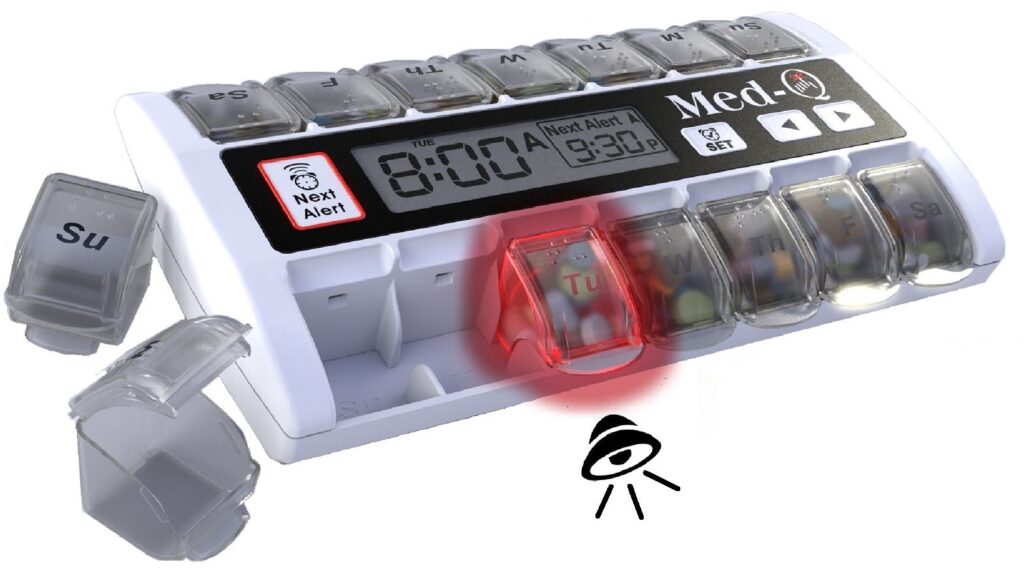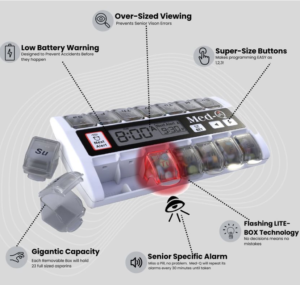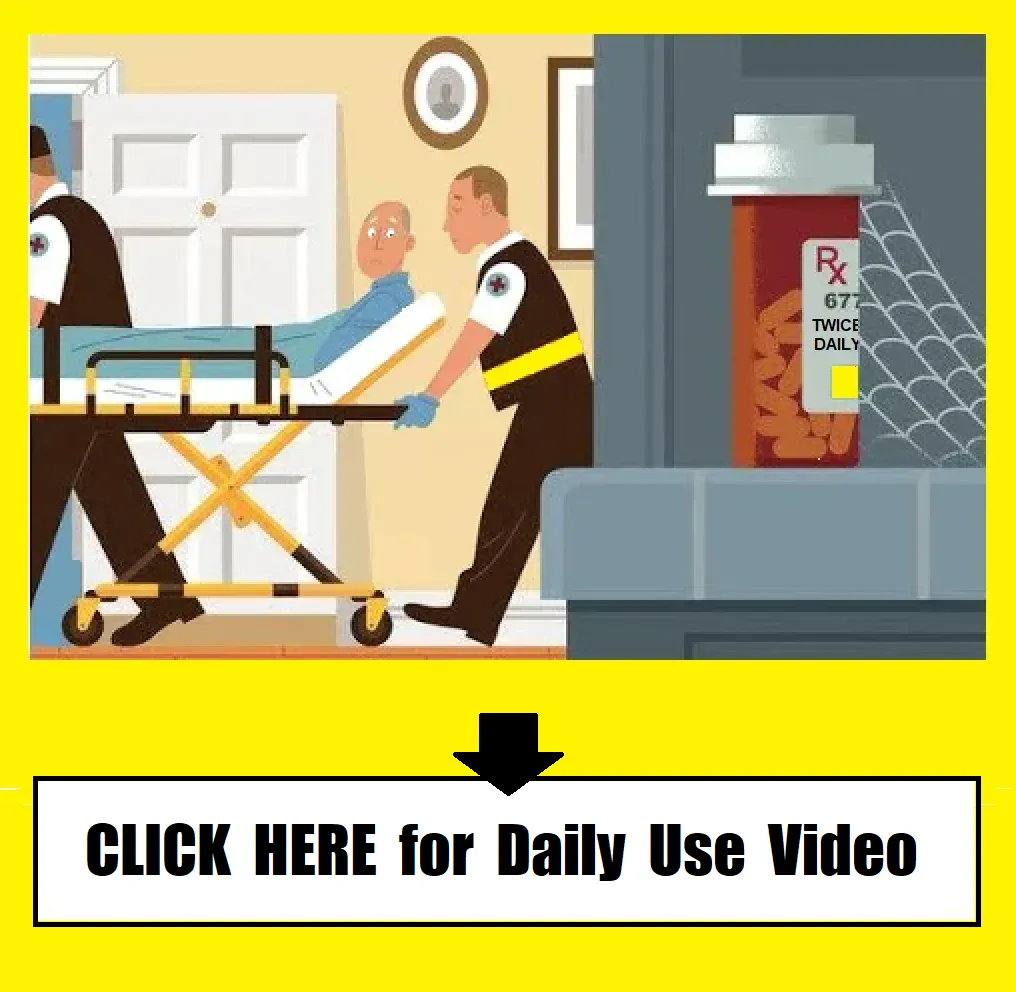People with Alzheimer’s need a Alzheimer’s Pill Dispenser with alarms
People with Alzheimer’s disease have special needs to take medicines
Med-Q is America’s #1Alzheimer’s Pill Dispenser with alarms

https://alzheimerspillbox.com/wp-content/uploads/2023/07/Daily-MED-Q-Use.mp4
People who are suffering with the trajectory of Alzheimer’s disease have special medication needs. Hence the need for a Alzheimer’s Pill Dispenser with alarms. People are often taking several prescription medications for other ailments. However, some may take medicines to treat the Alzheimer’s itself. Many meds will alter the seniors cause mood as well as create some behavioral changes. It can affect many other medical conditions. Caregivers need to make sure that medicines are taken as prescribed by the health care professional. They need to be taken safely and correctly. For example, the right dose at the right time. Med-Q Medication Compliance System offer up some helpful tips for managing pills and supplements for someone with Alzheimer’s or dementia.

The basics of Medication Compliance
First of all, it is critical to know each and every prescription medicine. Second of all, know each and every over-the-counter pill. Finally, know each and every supplement that is being taken. Make a list and of all the pill including the Alzheimer’s medication. Ask your doctor and/or your pharmacist these important questions.
- Why is this pill being taken?
- What are the positive effects that I should be on the look-out for. Also, when should we see results?
- How long does the Alzheimer’s patient take it?
- What is the exact dose. In addition, when does he or she take the medicine?
- What happens in the event that a person misses their dose.
- What are the side effects, and what can I do about them?
- Is there a smart Alzheimer’s Pill Dispenser with alarms or Med Reminder that will help?
- Can this medicine cause problems if when interacting with other prescriptions and supplements?

Managing medications can be made much easier when if you have a complete itemized listing of all of them.
The list should include:
- Print out the exact name of the medications.
- Include the name and phone number of the healthcare professional who prescribed it.
- List how much the person with Alzheimer’s takes (Dose).
- List when the medication should be taken.
- Last, how often it is taken.
Med-Q suggest you down load the template from Tracking Your Medications: Worksheet. Keep your itemized list in a safe place. In addition, keep a copy in your wallet or purse. Put the list under the Alzheimer’s Pill Dispenser with alarms or you can even try to make picture on your phone. Be sure to have the list on all visits to the doctor and pharmacist.
A special alert for those who are taking a new Alzheimer’s medication. Follow the healthcare’s detailed instructions. In the event of any unusual symptoms, report them immediately. away. Also, be sure to inform the doctor know before adding or changing any prescription pills.
An Alzheimer’s Pill Dispenser with alarms is critical for medication safety
 People with Alzheimer’s disease often need help taking their medicines. If the person lives alone, you may need to call and remind him or her or leave notes around the home. A pillbox allows you to put pills for each day in one place. Some pillboxes come with alarms that remind a person to take the medicines.
People with Alzheimer’s disease often need help taking their medicines. If the person lives alone, you may need to call and remind him or her or leave notes around the home. A pillbox allows you to put pills for each day in one place. Some pillboxes come with alarms that remind a person to take the medicines.
As Alzheimer’s gets worse, you will need to keep track of the person’s medicines. You also will need to make sure the person takes the medicines or give the medicines to him or her.
Some people with Alzheimer’s take medicines to treat behavior problems such as restlessness, anxiety, depression, trouble sleeping, and aggression.
Experts agree that medicines to treat behavior problems should be used only after other strategies that don’t use medicine have been tried. Talk with the person’s doctor about which medicines are safest and most effective. With these types of medicines, it is important to:
- Use the lowest dose possible.
- Watch for side effects such as confusion and falls.
- Allow the medicine a few weeks to take effect.
It is recommended that people with Alzheimer’s should NOT take anticholinergic drugs. These drugs are used to treat many medical problems such as sleeping problems, stomach cramps, incontinence, asthma, motion sickness, and muscle spasms. Side effects, such as confusion, can be serious for a person with Alzheimer’s. These drugs should NOT be given to a person with Alzheimer’s disease. You might talk with the person’s doctor about other options. Examples of these drugs include:
- Ipratropium — brand name Atrovent
- Dimenhydrinate — brand name Dramamine
- Diphenhydramine — includes brand names such as Benadryl and Nytol
Some people, especially those with late-stage Alzheimer’s, may have trouble swallowing pills. In this case, ask the pharmacist if the medicine can be crushed or taken in liquid form. Here are other ways to make sure medicines are taken safely:
- Keep all medications locked up.
- Check that the label on each prescription bottle has the drug name and dose, patient’s name, dosage frequency, and expiration date.
- Call the doctor or pharmacist if you have questions about any medicine.
Medicines to treat Alzheimer’s disease
 Several prescription drugs are approved by the U.S. Food and Drug Administration (FDA) to help manage symptoms in people with Alzheimer’s disease. For some people, these medications may help slow down certain problems, such as memory loss. Slowing down memory loss can allow many people with Alzheimer’s disease to be more comfortable and independent for a longer time.
Several prescription drugs are approved by the U.S. Food and Drug Administration (FDA) to help manage symptoms in people with Alzheimer’s disease. For some people, these medications may help slow down certain problems, such as memory loss. Slowing down memory loss can allow many people with Alzheimer’s disease to be more comfortable and independent for a longer time.
In 2021, the FDA approved a new medication, aducanumab, through the accelerated approval pathway. The medication helps to reduce amyloid deposits in the brains of people with Alzheimer’s but has not yet been shown to affect clinical symptoms or outcomes, such as progression of cognitive decline or dementia.
Most medicines work best for people in the early or middle stages of Alzheimer’s. However, it is important to understand that none of these medicines can cure or stop Alzheimer’s. Visit How Is Alzheimer’s Disease Treated? for more information on medicines to treat Alzheimer’s and behavior symptoms.
Use a Alzheimer’s Pill Dispenser with alarms for other Medicines to treat other medical conditions
 Many people with Alzheimer’s disease also have other medical conditions such as diabetes, high blood pressure, or heart disease. They may take different medicines for these conditions. It’s important to track all the medicines they take and take the list with you to every visit to a doctor.
Many people with Alzheimer’s disease also have other medical conditions such as diabetes, high blood pressure, or heart disease. They may take different medicines for these conditions. It’s important to track all the medicines they take and take the list with you to every visit to a doctor.
For information about paying for medications, see Saving Money on Medicines.
Med-Q special Alzheimer’s Pill Dispenser offers these great links for valuable Alzheimer’s information
NIA Alzheimer’s and related Dementias Education and Referral (ADEAR) Center
800-438-4380
adear@nia.nih.gov
www.nia.nih.gov/alzheimers
The NIA ADEAR provides useful info as well as many and free printed information about Alzheimer’s. In addition, much more info as it releted to dementias. The will focus on needed help forcaregivers, families, spouse as well as health professionals. There is a working staff at ADEAR Center that will answer telephone, email, and written requests Also, they can refer people to other national and local tools and resources.
Alzheimers.gov
www.alzheimers.gov
This is a welath of good information Topics” good resources on Alzheimer’s and related dementias.
Eldercare Locator
800-677-1116
eldercarelocator@n4a.org
https://eldercare.acl.gov
U.S. Food and Drug Administration
888-463-6332
druginfo@fda.hhs.gov
www.fda.gov
